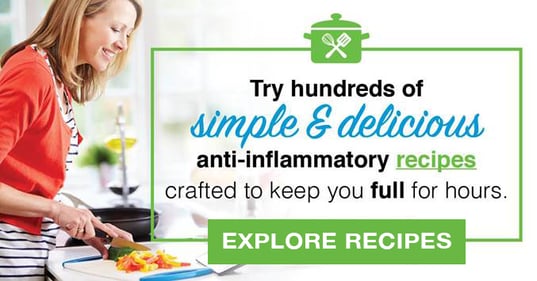As the sun starts to feel less intense, you may think your skin is safe from harm. But not so fast! There are other factors that can damage your skin, and they all have one thing in common; inflammation. Inflammation reduces the blood flow to the dermis, causing the degradation of elastin and collagen in the dermis (resulting in wrinkles), and causes the loss of dermal fat (reducing the plumpness of the skin). The dermis of the skin is composed of rapidly dividing cells that are very susceptible to changes in inflammatory mediators (such as eicosanoids and cytokines) that are produced because of inflammation. Thankfully, if you recognize these factors, you can work to reverse them, even in the cooler months.
Culprits to Avoid
Sugar: Sugar, (or more accurately the excess glucose found in sugar) increases inflammation in the skin. When you eat too much sugar the excess insulin induced by excess carbohydrates increases the inflammatory hormones known as eicosanoids that cause skin problems.
However, it's possible to get that sugar fix without an adverse reaction to your skin. Your brain requires about 130 grams of glucose per day. This means your total carbohydrate intake per day should be about that level. Just beware, any carb intake higher than 130 grams can lead to inflammation leading to excess cortisol production that ages the skin.
Alcohol: When we hear alcohol can cause organ damage we usually think, liver, or pancreas. But what's our largest organ? Our skin! Add in the fact that it deprives our skin of vital vitamins and nutrients and can cause skin disorders such as Rosacea, and suddenly that glass of wine sounds far less appetizing. Unfortunately, all alcohol does is bring the blood up to the tissue causing inflammation, hence why it's harmful to the skin.
So, put down that cocktail and pick up a Maqui-tail (not kidding- I make one from club soda and the powder of a MaquiRx capsule split open). When you skip the happy hour, some great things happen. For one thing, you're making less free radicals that cause inflammatory damage. Also, your skin's lipid barrier will begin to heal itself from inflammation caused by alcohol, and your face will reduce its puffiness as a result of that decreased inflammation. Your skin will appear less flushed since there's less vasodilation of the arteries on the surface of the skin.
Trendy Diets: More and more people are trying trendy diets in an effort to improve their skin health. However, many doctors advise against this as it can cause people to miss out on essential nutrients and can actually increase inflammation. So let's take a closer look at some of these diets:
Paleo: A true Paleo diet has the same macronutrient composition of the Zone Diet without calorie restriction. Excess calories can promote inflammation.
Intermittent Fasting: This is a calorie-restricted diet without any defined macronutrient composition. Unfortunately, this makes for an imbalance of protein to carbohydrate which is necessary to control inflammation.
Detox Diet: These types of diets act as laxatives and diuretics to cause weight loss. Usually, they are high-protein diets with added fiber and no sugar or alcohol for a strict period of time because they can't be maintained. As an unbalanced diet, these can also be considered a pro-inflammatory diet.
Keto: This is a pro-inflammatory diet that increases inflammation.
Atkins: This is a ketogenic diet that is pro-inflammatory.
The dietary key for better skin is following a strict anti-inflammatory diet. This would be a calorie-restricted yet balanced diet with adequate protein, moderate carbs (primarily non-starchy vegetables), and low in fat (primarily monounsaturated fats). As for supplements, the only two that will reduce inflammation are omega-3 fatty acids and polyphenols. Better skin comes from the inactivation of enzymes that degrade collagen and elastin, as well as increase blood flow to the skin. Adding extra fish oil is a good way to achieve even faster results for the skin. Adding polyphenols helps to stabilize free radicals, thus helping to prevent cell damage and its adverse effects. You just have to supplement with enough of both to reduce inflammation in general.
Remember, healthy skin comes far more from the inside than from covering up inflammation-induced damage. When you take the time to treat your skin and eliminate these inflammatory culprits, you'll soon be swapping out bad skin days for good.







Let Us Know What You Thought about this Post.
Put your Comment Below.